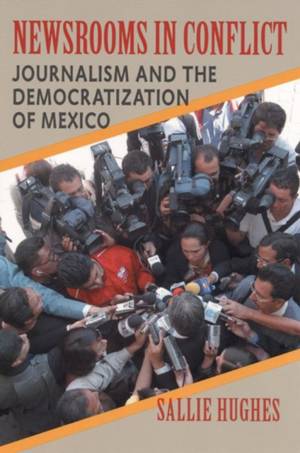
Je cadeautjes zeker op tijd in huis hebben voor de feestdagen? Kom langs in onze winkels en vind het perfecte geschenk!
- Afhalen na 1 uur in een winkel met voorraad
- Gratis thuislevering in België vanaf € 30
- Ruim aanbod met 7 miljoen producten
Je cadeautjes zeker op tijd in huis hebben voor de feestdagen? Kom langs in onze winkels en vind het perfecte geschenk!
- Afhalen na 1 uur in een winkel met voorraad
- Gratis thuislevering in België vanaf € 30
- Ruim aanbod met 7 miljoen producten
Zoeken
€ 83,95
+ 167 punten
Omschrijving
Newsrooms in Conflict examines the dramatic changes within Mexican society, politics, and journalism that transformed an authoritarian media institution into many conflicting styles of journalism with very different implications for deepening democracy in the country. Using extensive interviews with journalists and content analysis spanning more than two decades, Sallie Hughes identifies the patterns of newsroom transformation that explain how Mexican journalism was changed from a passive and even collusive institution into conflicting clusters of news organizations exhibiting citizen-oriented, market-driven, and adaptive authoritarian tendencies. Hughes explores the factors that brought about this transformation, including not only the democratic upheaval within Mexico and the role of the market, but also the diffusion of ideas, the transformation of professional identities and, most significantly, the profound changes made within the newsrooms themselves. From the Zapatista rebellion to the political bribery scandals that rocked the nation, Hughes's investigation presents a groundbreaking model of the sociopolitical transformation of a media institution within a new democracy, and the rise and subsequent stagnation of citizen-focused journalism after that democracy was established.
Specificaties
Betrokkenen
- Auteur(s):
- Uitgeverij:
Inhoud
- Aantal bladzijden:
- 296
- Taal:
- Engels
- Reeks:
- Reeksnummer:
- nr. 349
Eigenschappen
- Productcode (EAN):
- 9780822959281
- Verschijningsdatum:
- 30/06/2006
- Uitvoering:
- Paperback
- Formaat:
- Trade paperback (VS)
- Afmetingen:
- 156 mm x 235 mm
- Gewicht:
- 430 g

Alleen bij Standaard Boekhandel
+ 167 punten op je klantenkaart van Standaard Boekhandel
Beoordelingen
We publiceren alleen reviews die voldoen aan de voorwaarden voor reviews. Bekijk onze voorwaarden voor reviews.









